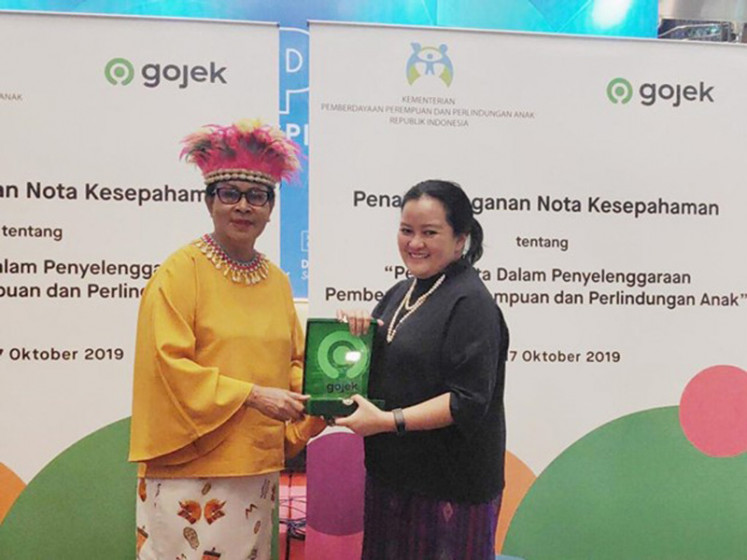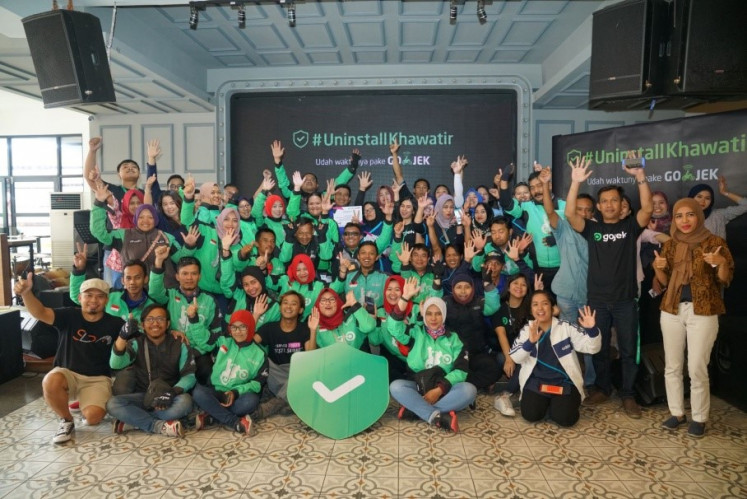
Gojek, the country’s leading on-demand services app, has partnered with the Women’s Empowerment and Child Protection Ministry to promote awareness about the security of women and children on public transportation and to empower women to become financially independent through business and technology.
The partnership includes educational workshops and training sessions for Gojek service providers and drivers, aiming to prevent violence against women and children while using Gojek services.
“Through this partnership, we are supporting the government’s effort to create friendly spaces for women and children. We hope they can feel safe in public spaces while using Gojek services,” says Shinto Nugroho, chief of public policy and government relations at Gojek.
The ministry has expressed its appreciation for Gojek’s initiatives, which have improved safety for women and children and have helped empower women to use on-demand technology.
“Gojek’s safety measures will create more secure public spaces for women and children,” said then-minister for women’s empowerment and child protection Yohana Susana Yembise while launching the cooperation effort in Jakarta on Oct. 17.
“Safety first” has always been Gojek’s motto. End-to-end safety assurance initiatives are carried out at users’ onboarding points. They include educational workshops on sexual violence for Gojek drivers in partnership with the international women's rights organization Hollaback!, additional safety features such as an “emergency button” and a “share my trip” feature on the app and insurance coverage through the state-owned insurance company Jasa Raharja.
To ensure security within its ecosystem, Gojek has collaborated with many specialized organizations and institutions.
Last month, Gojek teamed up with the National Police Traffic Corps by adopting a new multipurpose driver’s license, called Smart SIM, in an effort to reduce road accidents. An early adopter of Smart SIM, the tech company is able to track the driving history of its drivers, including their traffic violations.

Gojek also holds safety workshops for its female drivers alongside women’s empowerment startup Queenrides. To provide legal guidance and counseling for sexual assault victims, the homegrown tech company has collaborated with the trauma-counseling foundation Yayasan Pulih and the Legal Aid Institute of the Indonesian Women's Association (LBH Apik).
Gojek has emphasized the safety of its lifestyle services on GoLife, which is dominated by female partners. GoLife offers a number of daily services, including massage, house-cleaning, car-washing, electronic repair and laundry delivery services.
The company acknowledges the importance of female partners in its ecosystem as well as the possible risks these partners face during face-to-face interaction with their clients.
To curb sexual harassment, the company has launched an awareness campaign called #MulaiRespek (start respecting) on Twitter, aiming to encourage intervention before a sexual assault occurs. The company has also provided safety training to 35,000 GoLife female partners in 35 cities across the country.
GoLife has introduced two new features to increase its partners’ safety: “know your customer” and the “customer rating system”. As part of the company’s prevention efforts, GoLife clients who order a massage service after 10 p.m. must upload a picture of themselves and their ID card.
GoLife partners can give low ratings to clients for threatening behavior. It also has a security team available 24 hours a day that aims to improve the safety and comfort of the company’s partners and clients.
Shinto says that, as a technology platform, Gojek has helped millions of women have an active role in the digital economy as customers, drivers, merchants and partners with other on-demand services on the Gojek app. “A shared vision underlies the partnership between Gojek and the Women’s Empowerment and Child Protection Ministry,” she says.
In the past, Gojek and the ministry have collaborated to empower Indonesian women through technology.
One of the programs is Gojek Wirausaha (Gojek Entrepreneurship), which was launched last year and has trained over 15,000 small merchants in more than 30 cities across Indonesia. That number includes workers in the home industry organizations developed by the ministry. The workshops seek to equip women with basic entrepreneurial skills and technology so they can navigate the digital economy.
The ministry has taken notice of the importance of technology for individuals and the country. “Access to technology gives opportunities for women to make money and increase their skills and productivity. This supports our national economic growth as well,” Yohana said.
Gojek enables women to take part in economic activity and become financially independent through the various on-demand services available on its app, including GoRide, GoCar, GoFood and GoLife.
According to a study by the Demographic Institute of the University of Indonesia’s Economics and Business School (LD FEB UI), GoLife has increased the female labor force participation rate in Indonesia’s digital economy. The research revealed that more than 70 percent of GoLife partners are female and that more than 50 percent of them are the main breadwinners in their family.
Women use income from GoLife to provide for their family, allocating money to finance their children’s education (76 percent), improving their children’s nutrition (48 percent), paying debts (32 percent) and saving money to start a business (32 percent).
Gojek says it trusts and values female leadership within the corporation. “We have a larger share of female employees than other tech companies in the world,” said Shinto.
Based on Gojek’s internal database in Oct. 2019, women make up roughly 35 percent of employees in top management positions, such as managers and directors in the corporate sphere. This rate is higher than Facebook at 28 percent, Apple at 29 percent and Google at 25 percent, based on data from 2018.